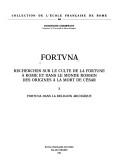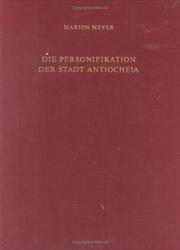| Listing 1 - 8 of 8 |
Sort by
|
Book
Year: 1970 Publisher: Stuttgart : Metzler,
Abstract | Keywords | Export | Availability | Bookmark
 Loading...
Loading...Choose an application
- Reference Manager
- EndNote
- RefWorks (Direct export to RefWorks)
Fortuna (Roman deity) --- German literature --- Baroque literature --- Emblems --- Fortuna (Divinité romaine) --- Littérature allemande --- Littérature baroque --- History and criticism --- Histoire et critique
Book
ISBN: 9782745316806 274531680X Year: 2007 Volume: 9 Publisher: Paris: H. Champion,
Abstract | Keywords | Export | Availability | Bookmark
 Loading...
Loading...Choose an application
- Reference Manager
- EndNote
- RefWorks (Direct export to RefWorks)
Comparative literature --- Thematology --- anno 500-1499 --- Fortuna (Roman deity) in literature. --- Fate and fatalism in literature. --- Literature, Medieval --- Fortuna (Divinité romaine) dans la littérature --- Destin et fatalisme dans la littérature --- Littérature médiévale --- History and criticism. --- Histoire et critique --- fortune (allégorie) --- littérature française --- Fortune in literature --- Rhetoric, Medieval --- History and criticism --- Fortuna --- In literature --- Fortuna (Divinité romaine) dans la littérature --- Destin et fatalisme dans la littérature --- Littérature médiévale --- Literature, Medieval - History and criticism --- Fortuna - (Roman deity) - In literature --- Fortuna - (Roman deity)
Book
Abstract | Keywords | Export | Availability | Bookmark
 Loading...
Loading...Choose an application
- Reference Manager
- EndNote
- RefWorks (Direct export to RefWorks)
Mythology --- Mythologie --- Iconography --- Iconographie --- Fortuna (Goddess) --- Fortuna (Déesse) --- Fortuna (Roman deity) --- -Art --- Fortuna (Déesse) --- Art --- Goddesses in art. --- Christian art and symbolism --- Art, Medieval --- Art, Renaissance --- Classical influences. --- Fortuna --- Tyche
Book
ISSN: 05545927 ISBN: 839018091X Volume: t. 29 Publisher: Warszawa : PWN,
Abstract | Keywords | Export | Availability | Bookmark
 Loading...
Loading...Choose an application
- Reference Manager
- EndNote
- RefWorks (Direct export to RefWorks)
Fortuna (Roman deity) --- Art, Roman --- Coins, Roman. --- Fortuna (Divinité romaine) --- Art romain --- Monnaies romaines --- Art. --- Themes, motives. --- Art --- Thèmes, motifs --- #ANTIL9712 --- Coins, Roman --- Roman coins --- Roman art --- Classical antiquities --- Themes, motives --- Fortuna (Divinité romaine) --- Thèmes, motifs
Book
ISBN: 9782840505488 2840505487 Year: 2008 Volume: 37 Publisher: Paris: Presses de l'Université Paris-Sorbonne,
Abstract | Keywords | Export | Availability | Bookmark
 Loading...
Loading...Choose an application
- Reference Manager
- EndNote
- RefWorks (Direct export to RefWorks)
Comment légitimer la victoire des armes ? Comment comprendre l'ascension ou la déchéance de certains hommes ? Comment choisir au milieu de la pluralité des possibles ? Fortuna est partout présente à la Renaissance pour décrire et juger les mouvements de l'histoire individuelle et collective. Ce livre propose l'étude des usages d'une figure de rhétorique, d'une image de mémoire extraordinairement plastique. Il ne considère pas la fortune comme un concept, mais comme une banalité des langages politiques et des représentations sociales. Loin d'être éternelles, les banalités tissent dans le temps la toile des appréciations et des justifications partagées qui impose le cadre dans lequel se meuvent les acteurs. En Italie et en France, des décors des fêtes publiques à la littérature pédagogique ou historiographique, en passant par les diverses formes d'écriture du soi, l'imaginaire politique et social travaille sur une Fortuna qui rend compte à la fois d'une nouvelle appréhension du temps, le temps des occasions, et d'un intérêt pour les ascensions échappant aux logiques humaines, notamment dynastiques. Le succès de l'iconographie renaissante de l'allégorie apparaît ainsi comme inséparable d'une légitimité d'élection, élection divine sanctionnée par un nécessaire consensus. Versant oublié du thème impérial, Fortuna invite à en reconsidérer la signification pour les princes de la Renaissance.
Fortuna (Roman deity) in literature. --- Rhetoric --- Politics and literature --- Fortuna (Divinité romaine) dans la littérature --- Discours politique --- Politique et littérature --- Political aspects --- History. --- Histoire --- Fortuna (Roman deity) in literature --- History --- Fortuna (Divinité romaine) dans la littérature. --- Histoire. --- Fortuna (Divinité romaine) dans la littérature --- Politique et littérature --- Rhetoric - Political aspects - Italy - History --- Rhetoric - Political aspects - France - History --- Politics and literature - Italy - History --- Politics and literature - France - History --- Richesse --- Représentations sociales --- Aspect politique --- Renaissance

ISBN: 2728300410 2728300429 2728301522 9782728300426 9782728300419 9782728301522 Year: 1987 Volume: 64 Publisher: Rome: École française de Rome,
Abstract | Keywords | Export | Availability | Bookmark
 Loading...
Loading...Choose an application
- Reference Manager
- EndNote
- RefWorks (Direct export to RefWorks)
Fortuna (Roman deity) --- Fortuna (Divinité romaine) --- Christian antiquities --- -Carthage (Extinct city) --- Christian inscriptions --- -Inscriptions, Christian --- Inscriptions --- Antiquities, Christian --- Antiquities, Ecclesiastical --- Archaeology, Christian --- Christian archaeology --- Church antiquities --- Ecclesiastical antiquities --- Monumental theology --- Antiquities --- Byzantine antiquities --- Christian art and symbolism --- Basilica Majorum (Carthage) --- Basilica Maiorum (Carthage) --- Basilique de Mcidfa (Carthage) --- Majorum Basilica (Carthage) --- Carthage (Extinct city). --- Tunisia --- Antiquities. --- Carthage (Extinct city) --- -Basilica Majorum (Carthage) --- Fortuna (Roman deity). --- Basilica Majorum (Carthage). --- Fortuna (Divinité romaine) --- Inscriptions, Christian --- Carthage (Ancient city) --- Carthago (Extinct city) --- Kart Hadasht (Extinct city) --- Qarțājannah (Extinct city) --- Carthage. Inscriptions chrétiennes primitives latines. --- Carthago. Vroegchristelijke inschriften (Latijnse). --- Fortune, divinité romaine --- --Christian antiquities --- --Fortuna (Roman deity) --- Inscriptions chrétiennes --- Épitaphes --- Carthage (ville ancienne) --- Tunisie --- Antiquités
Book
ISBN: 9780198786566 0198786565 019109014X 019182884X 9780191090141 Year: 2018 Publisher: Oxford: Oxford university press,
Abstract | Keywords | Export | Availability | Bookmark
 Loading...
Loading...Choose an application
- Reference Manager
- EndNote
- RefWorks (Direct export to RefWorks)
What is good luck and what did it mean to the Romans? What connections were there between luck and childbirth, victory in war, or success in business? What did Roman statesmen like Cicero and Caesar think about luck? This volume aims to address these questions by focusing on the Latin goddess Fortuna, one of the better known deities in ancient Italy. The earliest forms of her worship can be traced back to archaic Latium, and though the chronological scope of the discussion presented here covers the archaic age to the late Republic, she was still a widely recognized allegorical figure during the Middle Ages and the Renaissance. The primary reason for Fortuna's longevity is that she was a conceptual deity, symbiotically connected to the concept of chance and good fortune. When communities, individuals, and social groups interacted with the goddess, they were inevitably also interacting with the concept: renegotiating it, enriching it with new meanings, and challenging established associations. All the available literary, epigraphic, and archaeological sources on Fortuna are explored here in depth, including analyses of all the attested sanctuaries of the goddess in Italy, an updated study of inscribed gifts offered to her by a variety of individuals, and discussion of how authors such as Cicero and Caesar wrote about Fortuna, chance, and good luck. This study of the goddess based on conceptual analysis serves to construct a radically new picture of the historical development of this deity in the context of the cultural interactions taking place in ancient Italy, and also suggests a new approach to polytheism based on an exploration of the connection between gods and goddesses and concepts
Comparative religion --- Roman history --- Fortune --- Goddesses, Roman. --- Fortune. --- Religion. --- History. --- Fortuna --- 510-30 B.C. --- Rome --- Rome (Empire) --- History --- Goddesses, Roman --- Fortune, divinité romaine --- --Rome ancienne --- --Religion --- --République --- --Divinité --- --History --- Religion and state --- Фартуна --- Fartuna --- Фортуна --- Φορτούνα --- Phortouna --- 포르투나 --- P'orŭt'una --- פורטונה --- Forṭunah --- Tyche --- E-books --- Gods, Roman. --- Fortune - Rome - History --- Rome ancienne --- Religion --- République --- Divinité --- Fortuna - (Roman deity) --- Rome - History - Republic, 510-265 B.C. --- Rome - History - Republic, 265-30 B.C.

ISBN: 9783110191103 Year: 2006 Volume: 33 Publisher: Berlin ; New York Walter de Gruyter
Abstract | Keywords | Export | Availability | Bookmark
 Loading...
Loading...Choose an application
- Reference Manager
- EndNote
- RefWorks (Direct export to RefWorks)
Tyche (Greek deity) --- Fortuna (Roman deity) --- Sculpture, Greek --- Sculpture, Classical --- Personification in art --- Excavations (Archaeology) --- Tyché (Divinité grecque) --- Fortuna (Divinité romaine) --- Sculpture grecque --- Sculpture antique --- Personnification dans l'art --- Fouilles (Archéologie) --- Antioch (Turkey) --- Antioche (Turquie) --- Antioche (Turquie) dans l'art --- Antiquities --- In art --- Religion --- Antiquités --- Tyché (Divinité grecque) --- Fortuna (Divinité romaine) --- Fouilles (Archéologie) --- Antiquités --- Classical sculpture --- Classical antiquities --- Antioch --- Antakya (Turkey) --- Antakiya (Turkey) --- Antiokhii︠a︡ (Turkey) --- Antiokheia (Turkey) --- Antakye (Turkey) --- Antakiyah (Turkey) --- Antioche (Turkey) --- Antioch on the Orontes (Turkey) --- Hatay (Turkey) --- Antiochea (Turkey) --- Antiochia (Turkey) --- Antiocheia (Turkey) --- Antiochia Syriae (Turkey) --- Antiquities. --- In art. --- Religion.
| Listing 1 - 8 of 8 |
Sort by
|

 Search
Search Feedback
Feedback About UniCat
About UniCat  Help
Help News
News